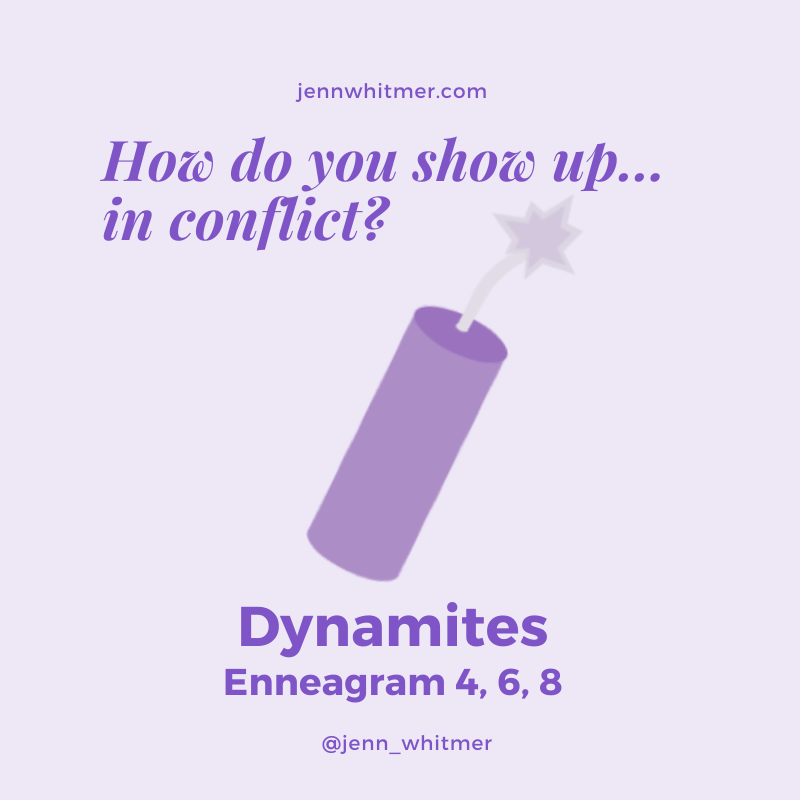Conflict is here to stay, so peacemaking must become a permanent resident too.
Imperfect people clashing over imperfect wants and needs provides many sparks for conflict. How you cope with the conflict makes the difference between a firecracker or a bomb.
Today’s Enneagram conflict coping styles:
Dynamites
Fours, Sixes, and Eights
This group shares similar helpful and unhelpful responses in conflict. This group tends to look for emotional responses when facing disappointment—their own and others. Through their emotions, they establish a connection to the problem as real, but the emotional reaction is also a shield.
This group may include you if you tend to:
- React emotionally or intensely first.
- Get worked up.
- Get frustrated when others don’t respond with the same level of emotional intensity.
- Take a while to trust.
- Have strong opinions.
- Fear being unsupported, abandoned, or controlled.
- Get moody, pessimistic, or confrontational.
Here’s what’s great about Dynamites in conflict:
You welcome and honor all the feelings in the room.
What Dynamites can do to grow:
Learn to lower your intensity. Full out aggression, passive digs, or pouting do you no favors in conflict resolution. When you stop using emotions as a shield to protect yourself against others and disappointment, you can build trust and find solutions.
In-the-moment trick:
Take a slow, low breath. Mentally imagine yourself turning a dial from 100 to 50. And release that breath. Learn how to use your InstaPot quick release value in a safe way.
Look through the images for specific descriptions of each type.
Fours: In Conflict
Fear their place, or even themselves, is insignificant.
Can assume the external conflict is because they are flawed internally.
Criticism of their creation is inseparable from personal critique.
Need to express their emotions in processing.
Feel others may have something they don’t.
Fear they are lacking in a way that means they can’t be loved.
Sometimes send mixed messages.
May require picking sides so they don’t feel abandoned.
Fours: Remember
You are seen and loved for the unique person you are.
Learn how to embrace equanimity.
Accept that sometimes the known, rather than novel, is the best choice.
Stay engaged. Don’t play hard-to-get.
Ask for what you need with authenticity so people aren’t guessing.
Sixes: In Conflict
Fear being without clear direction or support, but also want independence.
High adrenaline in adversity.
“Yes, but…”
Ask all the questions.
Fiercely loyal and expect that of others.
Have anxiety about many concerns. Would like others to match that intensity.
See the world is dangerous or threatening.
Question if authority will really support them.
Vigilant in looking for solutions to calm fear.
May quickly appease or be the rebel.
Sixes: Remember
You are secure.
Learn to be brave and do it afraid.
Prioritize your questions.
Name your feeling of anxiety and ask for a moment to release emotional pressure.
Be open to possibilities as much as troubleshooting.
Keep a record of what went well.
Eights: In Conflict
Fear being controlled.
You’ll know if they are unhappy. Direct and clear.
Feel anger first.
Look for intensity.
Disagreeing is fun.
See injustice and want to rescue or defend the victim.
Protect their people, but will cut off relationships if betrayed.
It’s right, or it’s wrong. And my opinion is right.
Always a warrior. Never show weakness.
Eights: Remember
Vulnerability is strong.
Learn to see the innocence in interactions.
Assume people are doing the best they can.
Become comfortable the nuance (or gray) of conflict.
Learn to test your assumptions with questions.
Don’t confuse anger with passion or hurt.
Learn the power of self-restraint.I’d love to support you in your growth. Visit jennwhitmer.com/work-with-me or jennwhitmer.com/enneagram for enneagram coaching to find out how I can serve you beyond this little app.

COMMENTs:
0